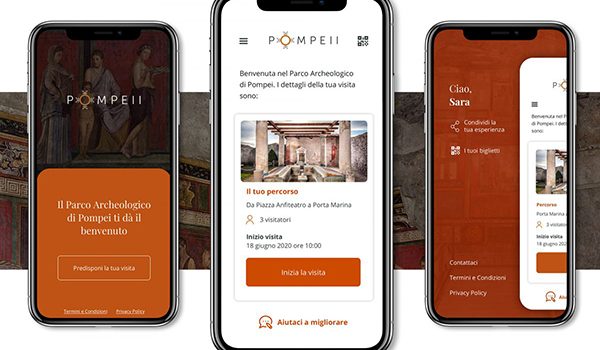POMPEII OPENS ITS DIGITAL ARCHIVES TO FREE CONSULTATION – Through the OPEN POMPEII SYSTEM, A REVOLUTION IN DATA ACCESS
A WEALTH OF DATA JUST A CLICK AWAY
An immense wealth of data of the Archaeological Park of Pompeii, collected over decades and significantly increased in recent times thanks to the Great Pompeii Project under the direction of Massimo Osanna, will now be within everyone's reach with a click, for consultation, study and in-depth analysis. An archive of transparent glass, available and accessible to everyone, not only to scholars and with the possibility of interacting and integrating useful information.
Pompeii has opened its digital archives, through the Open Pompeii system. A revolution in the consultation of data on the archaeological heritage of the Park, with a view to maximum accessibility and interactivity in research and use.
Available online data includes information, images and videos on each archaeological structure, house and building. Information on finds, frescoes present or detached, their origin and current location, for example in a museum or in storage, with related bibliography and possibility of crossing data.
A step forward in research, available to visitors, scholars, tour operators, guides or even enthusiasts, who can access the system from any device.
The system will also be accessible through the My Pompeii App implemented in order to improve the visit to the site. The application has the function of an audio guide and will allow the visitor to interact with the Park by sending reports during the visit and receiving direct and immediate feedback.
"The Open Pompeii system, which will allow access to an immense database of documents and information, never before made available to the public, is an operation that can be defined as radical and courageous and that is part of the broader effort of the Ministry of Culture”. states the Director Gabriel Zuchtriegel. “Through the National Plan for the digitization of cultural heritage of the Central Institute for the digitization of cultural heritage Digital Library, the Ministry is implementing a process of digital transformation, of all the state places of culture that own, protect, manage and enhance the Cultural Heritage, with a view to full accessibility as well as improving the protection and knowledge of heritage. With Open Pompeii we reach an important milestone in this area, but it is absolutely not the end of this journey: Digitalization will continue in the coming years and for this reason the feedback from users will be invaluable."
The consultation of information is based on a simple and intuitive interface that, through a map, allows the user to interact with the system and view the various information levels, navigating between regions, insula, units and rooms. Using the built-in search engine, you can search for the desired information about units or archaeological finds.
The database that feeds the Open Pompeii information system is the result of an aggregation of data from the main management systems in use in Pompeii (SI-Pompeii for geographical data and personal information, SIAV for Catalograchic information, Tolomeo for historical archive photos).
The project, thanks to an agreement with the Archaeological Park of Pompeii, has received the important technical-scientific contribution of the CINI Consortium (National Interuniversity Consortium for Informatics), the main reference point for national academic research in the fields of Computer Science and Information Technology, with the collaboration of the IMT School for Advanced Studies Lucca (university, research and higher education institution) and GSSI Aquila (Gran Sasso Science Institute of L'Aquila); the best Italian universities conducted research in all its 4 areas of Physics, Mathematics, Computer Science and Social Sciences.
They made use of interdisciplinary skills conveyed in synergy towards the implementation of the application domain of cultural heritage: archaeologists, archivists, experts in the history of ancient art, data organization and analysis, IT, machine learning and artificial intelligence. The result has been an innovative system that continues to be developed and expanded to provide more and more functions and accessibility to users.
Contributors: Rocco De Nicola, rector of the IMT of Lucca, Maria Luisa Catoni, Agnese Ghezzi, Ludovico Iovino Riccardo Olivito, Fabio Pinelli, Alessandro Poggio.
RUP and Project Execution Management: Alberto Bruni of the Archaeological Park of Pompeii with the collaboration of Salvatore Gallo and Fabio Garzia.
The project is financed with community resources of the PON Culture and Development - Great Pompeii Project and the app with PON Legality resources of the Ministry of the Interior.


